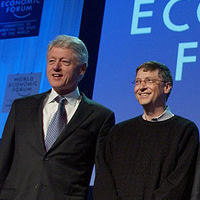Through their foundations and personal-diplomacy efforts, Bill Gates and Bill Clinton are changing how the international community addresses global health concerns. The Bill & Melinda Gates Foundation is the world's wealthiest philanthropy, and it has used its wealth to help set the governance agenda for global health. The William J. Clinton Foundation has used the former president's stature to negotiate agreements between governments and pharmaceutical companies that had previously stymied international trade negotiations for years. The prominence of these two foundations raises a host of issues about the role of private actors in international governance, policy accountability within the international community and the ethical obligations for eliminating global health disparities.
Under the current global health regime, the vast majority of medical benefits and medical research benefit the world's wealthiest 20 percent -- even though poor countries shoulder 80 percent of the global burden of disease. By the early 2000s, worldwide annual expenditures on medical research totaled $70 billion, yet 90 percent of this funding focused on diseases that constitute a mere 10 percent of the global burden of disease. Of the 1,223 new drugs developed between 1975 and 1997, only 13 -- a mere 1.06 percent -- were for treating tropical diseases.
Why do such disparities exist? Part of the problem is a failure of incentives. Drug companies fail to see the pay-off for investing in diseases that primarily afflict the poor. Research focuses on diseases prevalent in developed countries because there is a higher chance of a financial payoff. To overcome this situation, the incentives for medical research and pharmaceutical development need to change so that drug manufacturers and medical researchers invest their time and energy on programs that will explicitly benefit the health of the poor. It is by altering the incentives to encourage a greater supply of necessary drugs and increased access for those who demand these drugs that Bill Clinton and Bill Gates have sought to influence the global health agenda.

